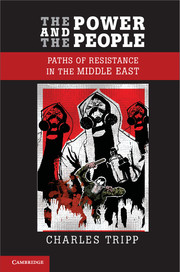Book contents
- Frontmatter
- Contents
- List of Illustrations and Credits
- Acknowledgements
- Glossary
- List of Abbreviations
- Introduction
- 1 State Capture and Violent Resistance
- 2 Contesting Public Space
- 3 Imposition and Resistance in Economic Life
- 4 Body Politics
- 5 History Wars
- 6 Symbolic Forms of Resistance
- Conclusion
- Notes
- Bibliography and Further Reading
- Index
2 - Contesting Public Space
Resistance as the Denial of Authority
Published online by Cambridge University Press: 05 January 2013
- Frontmatter
- Contents
- List of Illustrations and Credits
- Acknowledgements
- Glossary
- List of Abbreviations
- Introduction
- 1 State Capture and Violent Resistance
- 2 Contesting Public Space
- 3 Imposition and Resistance in Economic Life
- 4 Body Politics
- 5 History Wars
- 6 Symbolic Forms of Resistance
- Conclusion
- Notes
- Bibliography and Further Reading
- Index
Summary
RESISTANCE THROUGH NONVIOLENCE
On Tuesday 25 January 2011, groups of people began to assemble in Tahrir Square in the centre of Cairo, dwarfed at first by the huge open space and by the towering buildings that surround it, and hooted at impatiently by the usual maelstrom of traffic that circulates in and around the square. Gradually the numbers grew, to such an extent that they succeeded in blocking the traffic and attracted the attention of the authorities. The riot police were sent in to disperse them with tear gas and baton charges. They intervened not simply because the thousands that had now assembled were taking part in an illegal public demonstration, banned under the ‘emergency laws’ in force since 1981. It was also because this was a demonstration that was calling for the immediate overthrow of Husni Mubarak, the eighty-two-year-old president who was now in his thirtieth year of office – and who seemed ready to stand, virtually unopposed, for a further six-year term in September of that year. Shouts of ‘Irhal Mubarak!’ [Leave Mubarak!] and ‘Yasqut al-Nizam!’ [Down with the regime!] made it clear where the sympathies of the demonstrators lay.
At the same time, other groups of demonstrators assembled in front of public buildings across Cairo, chased by the police, but reassembling in ways the police found increasingly baffling and difficult to control. Meanwhile, thousands came out on the streets of Alexandria, Suez and a number of Egypt’s other major cities chanting slogans against the regime, waving placards that proclaimed their contempt for the president and defying police efforts to clear them off the streets. Hundreds of arrests were made and the riot police laid into the crowds, whilst other, more sinister security forces dragged demonstrators away in unmarked cars to unknown but grim destinations. Nevertheless, the demonstrators remained and returned in even greater numbers after prayers the following Friday, effectively occupying Tahrir Square and using it as the platform for continual denunciation of the regime of Husni Mubarak. Indeed, their one repeated demand was that Mubarak should leave office and, until that happened, they vowed not to leave the square. Astonishingly, within two weeks they had achieved their objective: on 11 February, the president stepped down, handing over power to the SCAF.
- Type
- Chapter
- Information
- The Power and the PeoplePaths of Resistance in the Middle East, pp. 71 - 133Publisher: Cambridge University PressPrint publication year: 2013



